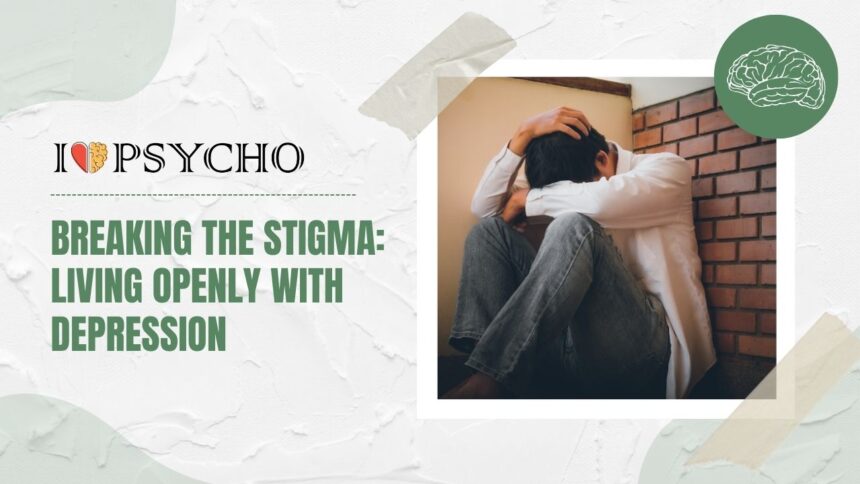Introduction to Depression
Welcome to a journey of breaking barriers and embracing vulnerability. In this blog post, we delve into the often overlooked topic of living openly with depression. Let’s shatter stereotypes, challenge misconceptions, and empower each other to embrace our mental health struggles with courage and authenticity. Join us as we explore the stigma surrounding depression and discover how openness can lead to healing and growth.
Understanding the Stigma of Mental Illness
Understanding the stigma of mental illness can be complex and challenging. Society often attaches negative stereotypes to those struggling with their mental health, perpetuating misconceptions and discrimination. This stigma can lead to feelings of shame, isolation, and reluctance to seek help. It creates barriers that prevent individuals from openly discussing their struggles and receiving the support they need.
People with mental illnesses are sometimes unfairly judged or labeled as weak, lazy, or even dangerous. These harmful beliefs further fuel the stigma surrounding mental health issues. Breaking down these preconceived notions requires education, empathy, and open-mindedness.
By understanding the impact of stigma on those living with depression or other mental illnesses, we can work towards creating a more compassionate and supportive environment for everyone. Let’s strive to replace judgment with compassion and misunderstanding with acceptance – together, we can break the stigma surrounding mental illness.
The Importance of Breaking the Stigma
The importance of breaking the stigma surrounding mental illness cannot be overstated. It is crucial for individuals living with depression to feel accepted and supported by their communities. When we stigmatize mental health disorders, we create barriers that prevent people from seeking help and speaking openly about their struggles.
By breaking the stigma, we can create a more inclusive society where individuals feel comfortable sharing their experiences without fear of judgment or discrimination. This can lead to increased awareness and understanding of mental health issues, ultimately paving the way for better support systems and resources for those in need.
When we challenge stereotypes and misconceptions about depression, we empower individuals to embrace their journey towards healing. Breaking the stigma is not just an individual responsibility; it requires collective action to change societal attitudes towards mental illness.
Let’s work together to create a world where openness and empathy prevail over ignorance and prejudice.
The Impact of Stigma on Those Living with Depression
Living with depression can be challenging on its own, but the added weight of stigma can make it even more difficult. The fear of judgment and misunderstanding from others can lead to feelings of isolation and shame.
Those facing mental health stigma may hesitate to seek help or talk openly about their struggles, fearing negative reactions or being labeled. This can prevent individuals from receiving the support they need to manage their condition effectively.
Stigma surrounding depression can also impact relationships, causing strain with friends, family, and coworkers who may not understand the illness. It might lead to feelings of alienation and a sense of being different from those around you.
The societal misconceptions about depression perpetuate harmful stereotypes that further isolate individuals struggling with this mental health condition. Breaking down these barriers is crucial in creating a supportive environment for those living with depression.
Breaking Down the Barriers: Steps to Living Openly with Depression
Living openly with depression can be a daunting journey, but breaking down the barriers is essential for healing and growth. The first step is self-acceptance – acknowledging that it’s okay not to be okay and seeking help is a sign of strength, not weakness.
Opening up to trusted friends or family members about your struggles can help alleviate the burden you may feel. Communication is key in fostering understanding and support from those around you.
Seeking professional help through therapy or medication can provide valuable tools for managing symptoms and improving overall well-being. Taking care of your physical health through exercise, proper nutrition, and sufficient rest can also play a significant role in managing depression.
Engaging in activities that bring joy and fulfillment, such as hobbies or mindfulness practices, can serve as positive distractions from negative thoughts. Remember, progress may be gradual, but every small step forward counts towards living authentically despite the challenges of depression.
Finding Support and Resources for Coping with Depression
Struggling with depression can feel isolating, but you are not alone. Seeking support and resources is crucial in coping with this mental health condition. One way to find help is by reaching out to trusted friends or family members who can offer a listening ear or accompany you to therapy sessions. Additionally, consider joining support groups either online or in person where you can connect with others who understand what you’re going through.
Therapists and counselors specialize in treating depression and can provide valuable tools and strategies for managing symptoms. Don’t hesitate to explore different treatment options such as medication, cognitive-behavioral therapy, or holistic approaches like yoga and meditation. Remember that self-care plays a significant role in managing depression; prioritize activities that bring you joy and relaxation.
Online resources like mental health websites, hotlines, and apps can also be beneficial sources of information and support on your journey towards healing. Be proactive in seeking the help you deserve – there is no shame in asking for assistance when needed.
Personal Stories of Overcoming Stigma and Living Openly with Depression
Embarking on the journey of living openly with depression takes immense courage. It’s like stepping into uncharted territory, facing uncertainties and vulnerabilities head-on. For many individuals, breaking the silence surrounding mental health struggles can feel daunting, but it is a transformative step towards healing.
Personal stories of overcoming stigma are powerful testaments to resilience and strength. They remind us that we are not alone in our battles and that there is hope beyond the shadows of depression. Each narrative serves as a beacon of light for those navigating similar paths, showing that recovery is possible even in the face of societal judgment.
Sharing these experiences helps dismantle misconceptions about mental illness and fosters empathy and understanding within communities. By embracing vulnerability and authenticity, individuals reclaim their narratives from stigma and inspire others to seek help without shame or fear.
These personal journeys serve as reminders that it’s okay not to be okay all the time; they teach us valuable lessons about self-compassion, acceptance, and perseverance in the face of adversity.
Coping Mechanisms and Treatment Options
Living with depression can be challenging, but there are coping mechanisms and treatment options available to help manage symptoms. One effective coping mechanism is practicing mindfulness and engaging in activities that bring joy and relaxation. This could include meditation, yoga, or spending time in nature.
Therapy is another valuable tool for those living with depression. Cognitive-behavioral therapy (CBT) can help individuals identify negative thought patterns and develop healthier ways of thinking. Additionally, medication prescribed by a mental health professional may be beneficial for some individuals.
It’s essential to prioritize self-care by getting enough sleep, eating well-balanced meals, and staying physically active. Building a strong support system of friends, family, or support groups can also provide comfort during difficult times.
Remember that it’s okay to seek help when needed and to explore different treatment options until finding what works best for you. Coping with depression is a journey, but with perseverance and the right tools, it is possible to lead a fulfilling life despite the challenges it may bring.
How Society Can Help End the Stigma
Society plays a crucial role in ending the stigma surrounding depression. Education is key – spreading awareness and understanding about mental health can help break down stereotypes and misconceptions. Encouraging open discussions about emotions and struggles without judgment can create a more supportive environment for those living with depression.
Promoting empathy and compassion towards individuals facing mental health challenges can foster a sense of community and belonging. By actively listening to others’ experiences, we can offer our support and reduce feelings of isolation that often accompany depression.
Advocating for policies that prioritize mental health services and resources can make professional help more accessible to those in need. By investing in mental healthcare infrastructure, society shows its commitment to addressing the needs of individuals struggling with depression.
Supporting initiatives that promote inclusivity and acceptance regardless of one’s mental health status helps create a culture of understanding and respect. Together, we can work towards eradicating the stigma associated with depression through collective efforts and advocacy for positive change.
Conclusion and Encouragement for Those Struggling with Depression
Living openly with depression is a courageous and empowering choice. By breaking the stigma surrounding mental illness, individuals can find support, understanding, and compassion from those around them. It’s essential to remember that you are not alone in your struggles.
Seeking help and reaching out for support is a sign of strength, not weakness. Remember that there are resources available to help you cope with depression and live a fulfilling life. Surround yourself with people who uplift and support you on your journey towards healing.
Take each day as it comes, be kind to yourself, practice self-care, and never lose hope. Your story matters, your feelings are valid, and there is light at the end of the tunnel. Keep going; you’ve got this!









